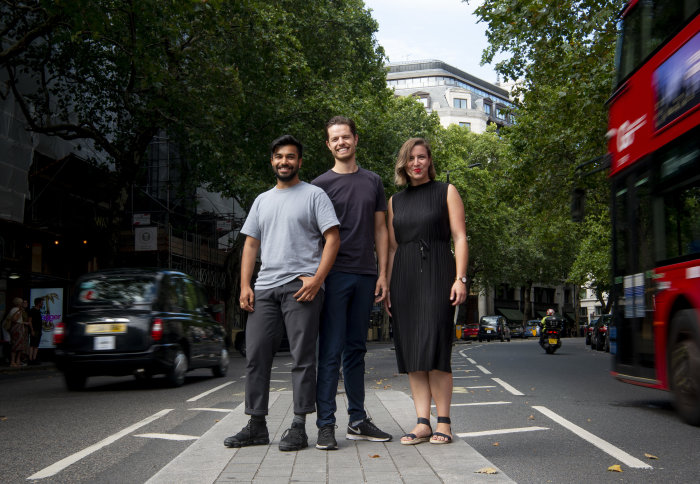Imperial graduate named one of Europe’s most innovative entrepreneurs

Leslie Nooteboom, co-founder of Humanising Autonomy, has been named as an MIT Technology Review Innovator under 35.
Leslie Nooteboom, who co-founded Humanising Autonomy, has been named as part of Europe’s leading community of innovators, pioneers and social changemakers. Leslie founded the startup alongside Maya Pindeus and Raunaq Bose, who are all Innovation Design Engineering graduates, a course run jointly by Imperial College London and the Royal College of Art.
Understanding human behaviour
Humanising Autonomy is building the global standard of interaction between Vulnerable Road Users and automated vehicles. Their pedestrian intent prediction platform makes autonomous vehicles safer and more efficient in urban environments.
Their platform uses machine learning to understand the behaviour of pedestrians. Using a combination of novel deep learning methods and behavioural psychology, they create computer vision models that can inform the system of the autonomous vehicle of a safer path forward, and warn human drivers through Advanced Driver Assistance Systems.
Earlier this year, the startup secured $5.3M seed investment to deploy their technology and were finalists in Imperial’s Venture Catalyst Challenge in 2017.
Building the global standard
The team said: "We have been working hard to build the global standard of interaction between Vulnerable Road Users and automated vehicles. Since the founding of the company in 2017 we have deployed the technology in the US, Germany and Japan, and built an incredibly talented team, all of whom have been crucial to get to this point."
In the past two years, the team has grown to 20 employees, including several Imperial alumni. The team brings together those with expertise in Deep Learning and Computer Vision, as well as Embedded Software

Engineers and Behavioural Data Scientists. They have also been expanding their commercial team and have been selected by Transport for London to participate in the Bus Safety Challenge, making London buses safer around Vulnerable Road Users.
"Our aim is to make cities more pleasant for their inhabitants," Leslie said. "That's why we've put together a team of very different profiles, such as psychologists, data engineers, machine vision engineers and data strategists."
Unlike current technologies, Humanising Autonomy is not limited to recognising people within a limited space and analysing gestures and emotions individually. Instead, it is able to understand if someone is distracted and if they are going to cross the street without paying immediate attention.
European community
Since 2011, the MIT Technology Review magazine has been searching for talented youth in different countries within Europe. The main objective of the regional European award has been to consolidate this young European community of innovators and pioneers.
The European programme lends visibility to the work of the most talented, young, technological leaders to strengthen an international innovation community. The winners have been selected by a jury, made up of experts from leading universities and companies, from more than 1,000 candidates.
Article text (excluding photos or graphics) © Imperial College London.
Photos and graphics subject to third party copyright used with permission or © Imperial College London.
Reporter
Joanna Wilson
Communications Division